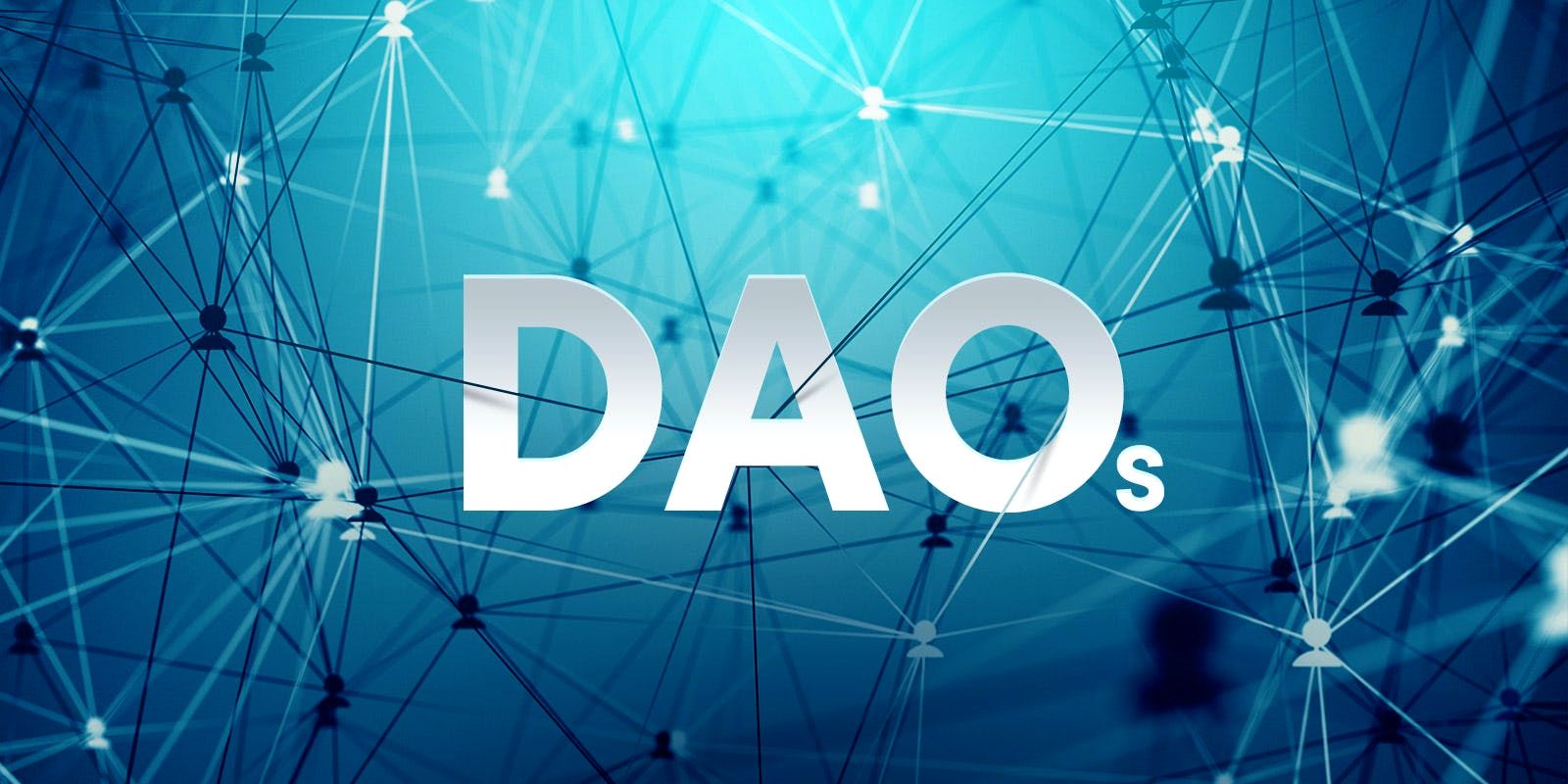A decentralized autonomous organization (“DAO“) is an entity that operates on blockchain networks governed by smart contracts. The advantage to DAOs is that instructions are executed when triggered by predetermined rules, which allows for transparency, cost savings, and decentralized decision-making in an encrypted environment.
How Does A Decentralized Autonomous Organization Work?
Decentralized autonomous organizations are block-chain based systems where individuals work towards a shared goal, completely governed by code. Traditionally, businesses operate within a hierarchical management structure with decision-makers at the top or as a board of directors. DAOs were created so that the individuals or members of an organization would have shared control. There is no CEO, no manager, and no hierarchy within a DAO, and the stakeholders involved equally share operations through an open-source code protocol.
This means equal parts ownership and decision-making power is created by a preset of rules in a completely transparent environment on open-source code (”Smart Contracts”). The rules dictate pre-conditions for a decision or action to be made and when they are met, those decisions or actions are carried out by the smart contract, eliminating the chance of human error manipulation. Additionally, DAOs are decentralized, meaning they are unaffiliated with any country or geographic jurisdiction.
The first DAO was created to act as a decentralized venture capital fund. The idea being that with equal investors, decision-making conducted through an open-source, automated system, and no direct regulation by a particular country—the DAO could theoretically exist as a flat organization immune to human manipulation with the ability to move money anonymously to any part of the world.
Since it’s inception, DAOs have been created for multiple other uses such as data distribution, governance, digital currency, social media, gambling, insurance, other types of funding, as well as a number of other use cases.
DAO DIY:
Creating a Decentralized Autonomous Organization

Anyone can create a DAO with the right community and funding. Below are common steps taken to create a DAO.
1. Problem and Solution
If you are considering creating a DAO you need to first identify a unique problem or something that you are passionate about that requires fixing or intervention.
2. Community + Goal
Once you’ve identified your problem and make it your goal to fix it, you need to build an engaged community who is willing to work toward addressing the problem.
3. Game Plan
With the problem, goal, and solution in mind, begin documenting how funding will specifically impact this goal. Identify what capital is needed to meet this goal. Then identify what the incentives are to invest in this fund and how to get your community on board
4. Smart Contract
With your game plan set, start writing a set of rules that indicate how the DAO will operate. These rules are then encoded in a smart contract. A smart contract is an encrypted piece of code that lives on a blockchain as an agreement between a seller and a buyer.
5. Funding
With your game plan and programmed smart contract, you’ll need to seek funding from your community. Funding is usually in the form of investing in tokens that are spent within the organization. Community members who invest will now have voting rights on the organizational operations.
6. Deployment
Once the funding phase has ended, you are ready to deploy your DAO. Upon deployment the DAO is completely autonomous and independent of the initial creator. The DAO now lives on the blockchain and your smart contract takes automated actions based on your preset rules. At this point, the DAO is open-source and all financial transactions are recorded on the blockchain for anyone to see.
7. Moving Forward
Once the DAO is fully functional, any decisions that need to be made about distributions of funds and proposals for the future are voted on my investors or members of the DAO. The majority vote will rule on changes to the DAO moving forward.
What Are The Advantages Of Decentralized Autonomous Organizations?
Decentralized autonomous organizations have their advantages in funding and business operations.
1. Governance
When a DAO is established, there is a type of governance or preset rules encoded into the blockchain protocol. Any proposed changes to the code are voted on by the DAO shareholders. The size of a user’s investment will dictate their voting power. Larger investors will receive more voting power than smaller investors. This type of governance ensures all shareholders are aware of the rules up front and have a vote in operations.
2. Structure
DAOs are flat organizations in which each individual investor in the network is an equal contributor and has a vote. This encourages community participation to achieve any specific goal of the DAO and gives everyone influence in shaping the DAO.
3. Transparency
Financial transactions that taken place in a DAO are recorded on the blockchain and available for anyone to view. Investors in the DAO can visibly see how funds are spent, which helps in how to spend and vote on fund allocations in the future.
The Downsides
While DAO’s appear to be the new wave of the future for business, there are disadvantages to DAOs as well.
Hacks
The first venture fund DAO was the “largest crowdfunding project in human history” raising $100 million in cryptocurrency in two days on the Ethereum blockchain in 2016. However, a hack resulted in a $55 million theft of that cryptocurrency. Although DAOs are based on encrypted blockchain technology that is usually impenetrable, there is always a chance that vulnerabilities and hackers could have negative impacts on the DAO and investors of the DAO.
Decentralization
Having a decentralized system has its advantages as it does not necessarily have to abide by regional jurisdictions; however, if there is a legal issue, then the decentralized nature of a DAO can present some challenges. DAOs involve the transfer of funds across multiple countries and, should a legal matter occur, then legal action would have to be addressed in multiple countries and jurisdictions as well as present cross-border contractual issues.
Legal Uncertainty
Decentralized autonomous organizations are in their infancy and evolving constantly. Within this ever-changing digital landscape, there are a number of legal gray areas such as regional jurisdictions, intellectual property, and personal liabilities.
Decentralized Autonomous Organization Use Cases
As DAOs gain in popularity, there are a number of new and interesting ways DAO blockchain platforms are being adopted. Currently, we are seeing DAOs used in corporate governance, funding, venture capital, social media, data distribution, gambling, insurance, and other business activities and continues to grow.
Examples Of Decentralized Autonomous Organizations
Decentralized autonomous organizations vary in function. Below is a list of popular DAOs.

- Augur – A peer to peer, decentralized gambling exchange powered by Ethereum
- Dash – Allows the transfer of digital money globally
- DXdao – Develops, governs, and grows DeFi protocols and products
- MakerDAO – Decentralized, collateral-backed cryptocurrency
- MetaCartel – Awards grant funding to support dApps in finding customers and pilot opportunities
- MolochDAO – Speedily and efficiently awards grant funding to projects across the Ethereum ecosystem
- Steem – A social blockchain that generates revenue streams to users sharing content
- Synthetix – Supports derivative trading in DeFi
- The DAO – The initial crowd-funding campaign dealing in Ethereum
- Uniswap – A decentralized automated liquidity protocol built on Ethereum
Why Do I Need Legal Guidance About Decentralized Autonomous Organizations?
There can be a number of legal gray areas when it comes to DAOs, spanning from regional jurisdictions, to the execution of smart contracts, to partnerships, liabilities, and more. Depending on the nature of the DAO and what jurisdictions it crosses over, it’s important to secure legal counsel like Montague Law to give guidance on how regional laws and cross-border contracts could impact DAOs.
Legal jurisdictions aside, there is also the matter of who could become liable for debts or legal action taken against a DAO. While the nature of a DAO is to run without human intervention, there are humans behind the creation of a DAO and those humans can be members or investors of a DAO. Whether you’re a member of a DAO or an investor in a DAO, the default assumption is that each person is part of a general partnerships, meaning every stakeholder (member or investor) is responsible for liabilities like money or services owed to another party.
Should a DAO go south, anyone in the general partnership of a DAO could be in danger of losing their personal assets. To avoid such risk, it is essential to have legal contracts in place at the beginning of the formation of a DAO to protect all DAO stakeholders and other potentially liable individuals or businesses involved. At Montague Law, our team can advise on the appropriate contracts required when forming a DAO in order to avoid potentially damaging financial and legal risks in the future.
Attorneys at Montague Law draft organizational documents in accordance with the needs of your DAO such as Articles of Organization, Articles of Incorporation, and Operating Agreements assuring that your entity’s operations, member rights, and governing bylaws are not only legally compliant but also appropriate to meet your project goals.
Mini-Glossary
Here are some important terms to learn when it comes to decentralized autonomous organizations:
Smart Contract: A smart contract is an encrypted piece of code that lives on a blockchain as an agreement between a seller and a buyer
General Partnership: A general partnership is a business arrangement in which multiple people agree to shares of all assets, profits, and financial and legal liabilities. Since each partner owns an equal share, any partner can be sued for business debts.
Liability: By law, a liability is something a person or company is responsible for owing (e.g., loans, debts, services, mortgages, taxes).
DeFi: DeFi, also known as decentralized finance, performs financial transactions over a blockchain cutting out the middleman by bypassing traditional banks and financial institutions.
To find out how Montague Law can help you with your Decentralized Autonomous Organizations (DAO), please call us at 904-234-5653 or contact us here.
The information provided on this website does not, and is not intended to, constitute legal advice; instead, all information, content, and materials available on this site are for general informational purposes only. Securities law is complex and highly fact specific to any given circumstance and readers should contact an attorney for advice regarding any type of legal matter.



